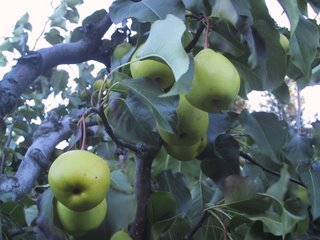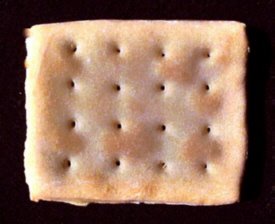Retro Musings from a Goat Cheese Farm, Part III

(This is the last part of a 3-part journal about my experiences studying at the Quillisascut Farm School in Eastern Washington in 2004. As another warning to squeamish folks I continue to discuss butchering in detail in this final part.)
6:30 am, Day 3: Morning milking
Well, technically morning milking was at 6 am, but little miss sleep deprived slept right on through the farms alarm clocks. Wool sweater on, fleece cap pulled low over my ears I jog up to the milking room just off the back of the goats fenced in area. Just in time Becky, says Rick, as he pulls another goat up the ramp and secures it to its holding bar.
Its simply amazing to me that there I am milking a goat and just 5 minutes earlier I was sound asleep. This one is named Pamelot and she hardly has any milk at all. Shes so sweet Rick and Lora Lea cant possibly get rid of her; this confirms that Pamelot is an honorary member of the "special farm". She finishes her alfalfa while Im still struggling to figure out this whole teat-milk-pail relationship. Milk is running down my arm and soaking into my sweater. I can barely hear myself think over the explosive sounds of milk hitting the side of a pail that Lora Lea is making.
Show-off.
Im breathing hard and a distinct cramp is forming in my hand. Meanwhile Pamelot is nuzzling my ear for more alfalfa. I think Im in love.
We finish the milking and all these black cats show up from every corner of the farm (until this moment not one of us has seen any of these cats) to drink the foam left in the bottom of the pails. One runs off with a paper filter they use to trap any sediment. Rick says this same cat consumes the entire filter every morning. Their furious licking scoops froth all over each others backs.
Meanwhile, Jet, the puppy, runs back and forth with a lamb hoof in her mouth.
8:45 am: This aint no Chick-Fil-A
So its chicken butchering time here on the farm and back home at this time Id be hours from waking up. Regardless, here I am handing over 10 pound plus chickens to Rick as he lays them down over a 2x4 and while his left hand holds them by the legs, his right swings the hatchet. Its a difficult maneuver that requires a lot of dexterity and a very sharp hatchet. He wishes the hatchet were just a bit sharper. I mean, the head almost came off in one chop. Some of my queasier comrades walk down the hill. The rest of us stand there sort of amazed, disgusted, in awe. I thought I wanted to kill a chicken myself. I thought it would be the right thing for me to do. You know, complete the circle of life. I wimp out. I just had these bad scenarios playing over in my head and none of them were pretty.
So I learned two things about chickens this morning. I always heard that chickens still move around when they lose their head. But I imagined that to mean some reflexive movements, sort of subtle-like.
Lesson one: chickens go freakin crazy. Head off, Rick holding their feet, the chicken is flapping its wings FULL FORCE, for a disturbing minute, at least.
Lesson two: if you unintentionally (or later, intentionally) press down on a chickens cavity when plucking it, it can cackle aloud just like a live chicken. Apparently, their voice box or voice box-equivalent does not need a head to function. This happened inadvertently to someones chicken on the table where we were working and we all jumped back in horror!
We dip the chickens in scalding hot water to loosen the feathers and fix to pluckin them (which takes a really long time). Where the lamb was very clean to butcher, the chicken is dirty, dirty, dirty. The only real way to remove all the internal organs is just to dig them out carefully with your hands, trying really hard not to puncture the intestines. I am treated to an unexpected surprise when I pull my hand out and see two small oval sacs. What are these? Oh, great! Those are chicken balls. Theyre a tasty delicacy. says Rick. Later, I fry them up in butter and learn another important lesson always poke a small hole in chicken testicles before you fry them. Basically they just got bigger and tighter in the pan until I exploded them, spreading hot butter all over myself and anyone in a 10 foot radius. What was left was certainly tasty though.
Meanwhile, Jet, the puppy, runs back and forth with a chicken head in her mouth.
Picnic Lunch at Roosevelt Lake
We carry a couple of large picnic baskets down to the beach and lay out blankets. Its sunny and warm and the food is wonderful: mugs of borscht and gazpacho, sandwiches of all types, rose hip iced tea, and Italian plum salad with grapes and elderberry syrup.
Reluctantly we pack up and go on a farm visit to Cliffside Organic Orchard. We tour through the peach, nectarine, apple, and pear trees and watch the family and crew sort and box up the apples for a wholesaler who will take the fruit to Whole Foods, PCCs, etc. in Seattle. We eat the best Jonathan apples.
Some time later ...
Back at the farm, we salt the hard grating cheese and set it out for drying. Im on evening chores so I help feed the turkeys, chickens, and quail. I run out to the garden by myself for some chard for the evening meal. In order to get to the garden you have to go through the goat pen. First, you disengage the electric fence, climb over, reengage it and then walk the 20 feet over to the garden gate where there is a combination lock and two latches, one a metal slide and the other, a metal clip.
I mention all these details so that you will understand the predicament I find myself in. There I am standing at the garden gate, in the goat pen, my right arm held high in the air, my fist wrapped tight around the chard stems. With my left hand, Im trying to shoo the goats back and slide the slide, clasp the clasp, and reconnect the combination lock. One look from the border collie puppy and the goats retreat 50 feet. I try to look menacing. I lower my voice. Now one has jumped up on my back and has grabbed a few leaves of chard. This emboldens the others. Within 30 seconds, there are 15 goats around me and Im sunk for sure. I am just about ready to give up when I see Rick down the road. In as dignified a manner as possible I squeak out a plaintive help? Laughing the whole way, he comes and rescues me and mentions that its always best to take a friend on garden trips. Got it.
Dinner that night:
End of summer rosemary zucchini soup with borage flowers
Smoked Cornish Cross chickens, foraged mushroom jus, farro squash risotto, savory scones, creamed spinach
Italian plum crisp
Day 4: Quillisascut Meat Festival
Today is a kitchen day, all day, all night we process all the foods weve harvested, including putting up apple butter and green tomato ketchup. We butcher and freeze most of the chickens and break down the lamb. In one day, I eat 10 plus different cuts/parts of meat.
Here is my list: simmered beef tongue with mustard, sauteed beef heart with greens and dragon tongue beans, country pate (with lard, lamb heart and meat, chicken hearts), duck and chicken gizzard prosciutto (from a previous group), stuffed lamb loin like we do at the Herbfarm filled with chard and mushrooms stuffed in lamb caul fat, an amazing handmade tagliatelle (made partially with spelt flour) with oxtail ragout, watercress and shaved curado, lamb moussaka, chicken liver mousse, lamb sausage and way too much wine that night. Oy.
Last day on the farm
We take a tour of Riverview organic orchard that also has a small business as a coffee roaster. I try my new favorite type of plum called a French petite. We gather together back at the farm for our last meeting and talk about being grateful for the week. We wrap up our many conversations about what is means to be sustainable and what well take with us from this experience.
I mention how amazed I am at how little garbage I personally produced in 5 days. It could fit in the palm of my hand. Thats truly incredible. In a typical day in Seattle I probably produce 10x that amount, if not more. In the Quillisascut kitchen they have 7 bins, the first is for pig scraps, then down the line, cat and dog scraps (all protein), goat scraps, compost, glass and aluminum, paper and finally, the smallest bin, trash.
We load up our cars, say our goodbyes to head back to the city, each and every one of us reluctant to start our cars.


0 Comments:
Post a Comment
<< Home